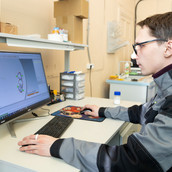Ural Federal University: Zirconium Dioxide Powder Developed for Crowns and Implants in the Urals
Scientists from the Ural Federal University and the Institute of High-Temperature Electrochemistry of the Ural Branch of the Russian Academy of Sciences have created zirconium dioxide ceramics for crowns and implants. It is not inferior to foreign analogs (Japan, Germany, Switzerland) in terms of strength and quality. In terms of cost, the final products have yet to be evaluated. The researchers and the industrial partner plan to start mass production of ceramics by 2027. The work is being carried out with financial support from the Priority 2030 program.
“We have been working on the development of zirconium dioxide ceramics for a long time. Such ceramics due to their unique properties such as strength, heat resistance, stability in an oxidizing atmosphere, high chemical and biological inertness, etc. can be used in many high-tech industries: from refractory and electrical insulating products, products for the chemical industry, vacuum technology to structural parts for nuclear power, radio engineering, aviation, and metallurgy. As there are difficulties with the supply of imported materials, we must establish the production of domestic materials for aircraft construction, turbine construction, and medicine as soon as possible. For this purpose, the Institute of High-Temperature Electrochemistry together with the Ural Federal University are creating a joint center for ceramic materials,” explains Yuri Zaikov, the scientific director of the Institute of High-Temperature Electrochemistry of the Ural Branch of the Russian Academy of Sciences.
Scientists have created a kind of analog of the powder of the world leader: the Japanese company Tosoh, which has been developing such powders for pressing for more than 40 years. Nowadays it isn’t easy to find disks made of such powders on the Russian market, and the cost of those that can still be bought has increased significantly.
“The samples that we have manufactured and tested are guaranteed to have a strength of at least 900 MPa. Within a year, we plan to raise this figure to 1000-1100 MPa. Then it will be possible to conduct tests in accredited laboratories, test for biological compatibility, and enter the market. We plan to launch mass production of the powder in Russia, at least 10 tons per year, by 2027,” says Maxim Mashkovtsev, Associate Professor at the UrFU Department of Rare Metals and Nanomaterials.
Companies producing powder and CAD/CAM disks and manufacturers of technical ceramics are interested in the implementation and commercialization of the project.
“The key supplier of dental zirconia ceramics to our market is China. Chinese materials are cheaper than their Japanese and European counterparts. We take this into account and realize that our materials must be competitive in terms of quality, production volume, and price. We calculate the business model with our partners and understand that the cost of our powder should be at the level of 7-8 thousand rubles per kg,” says Maxim Mashkovtsev.

